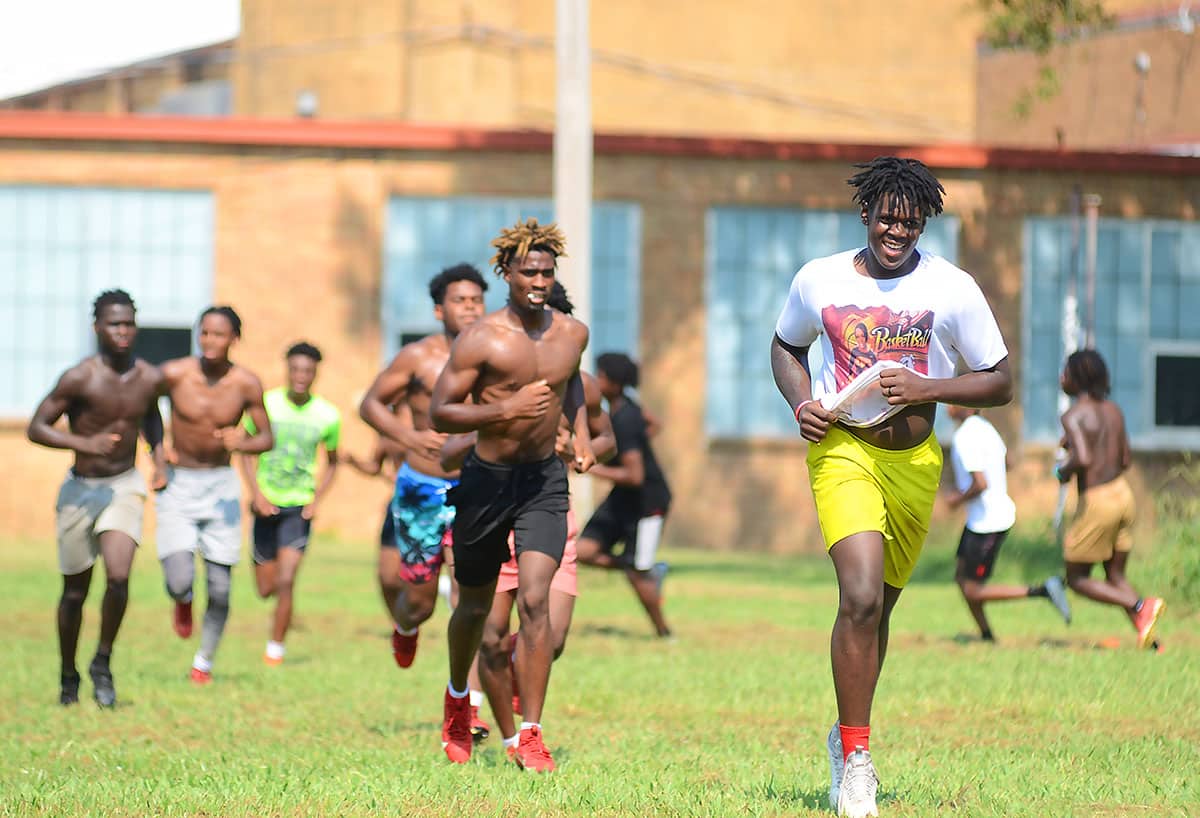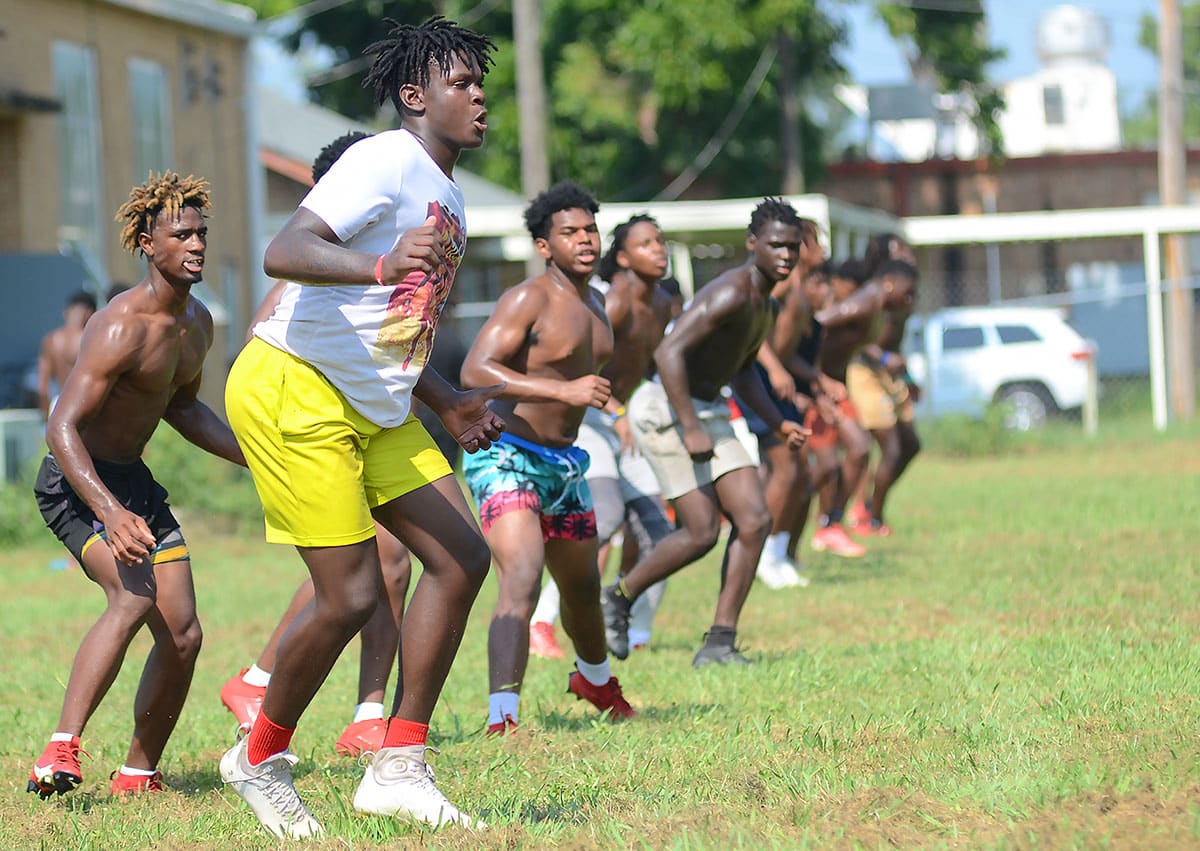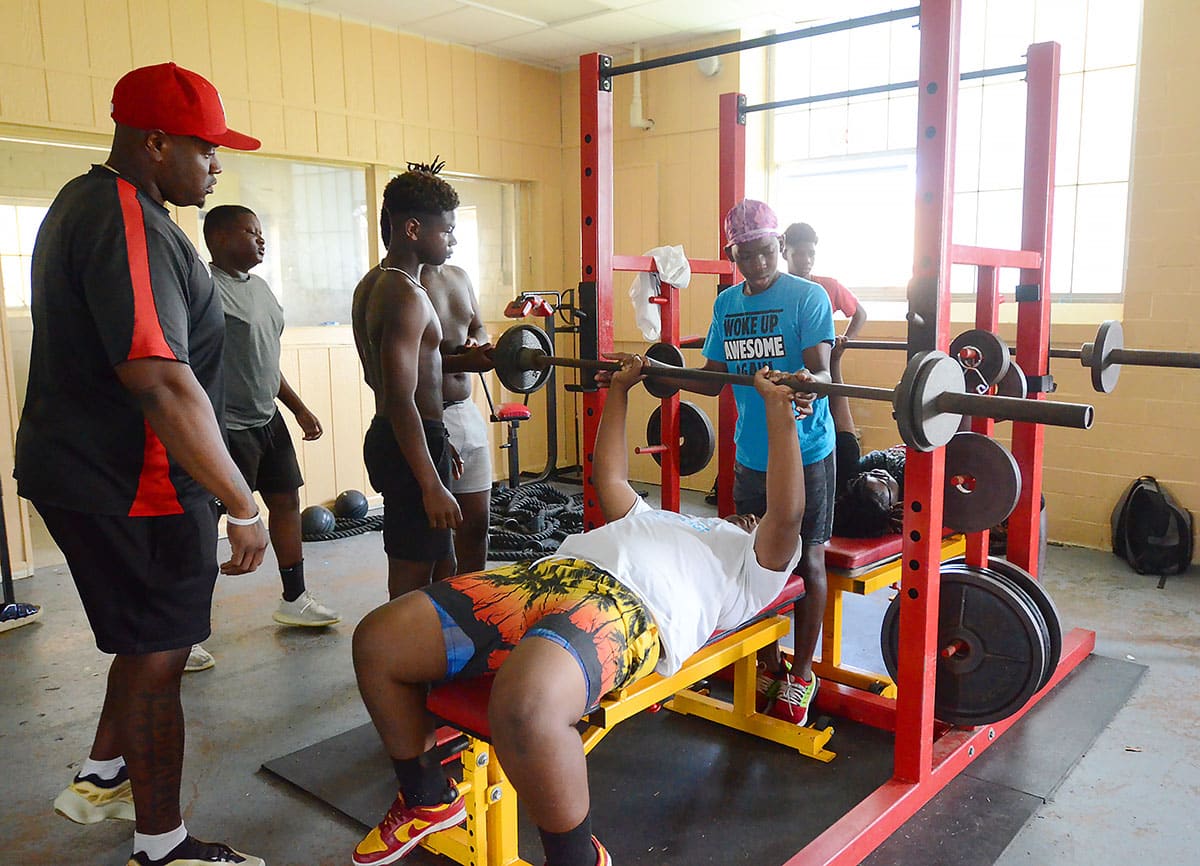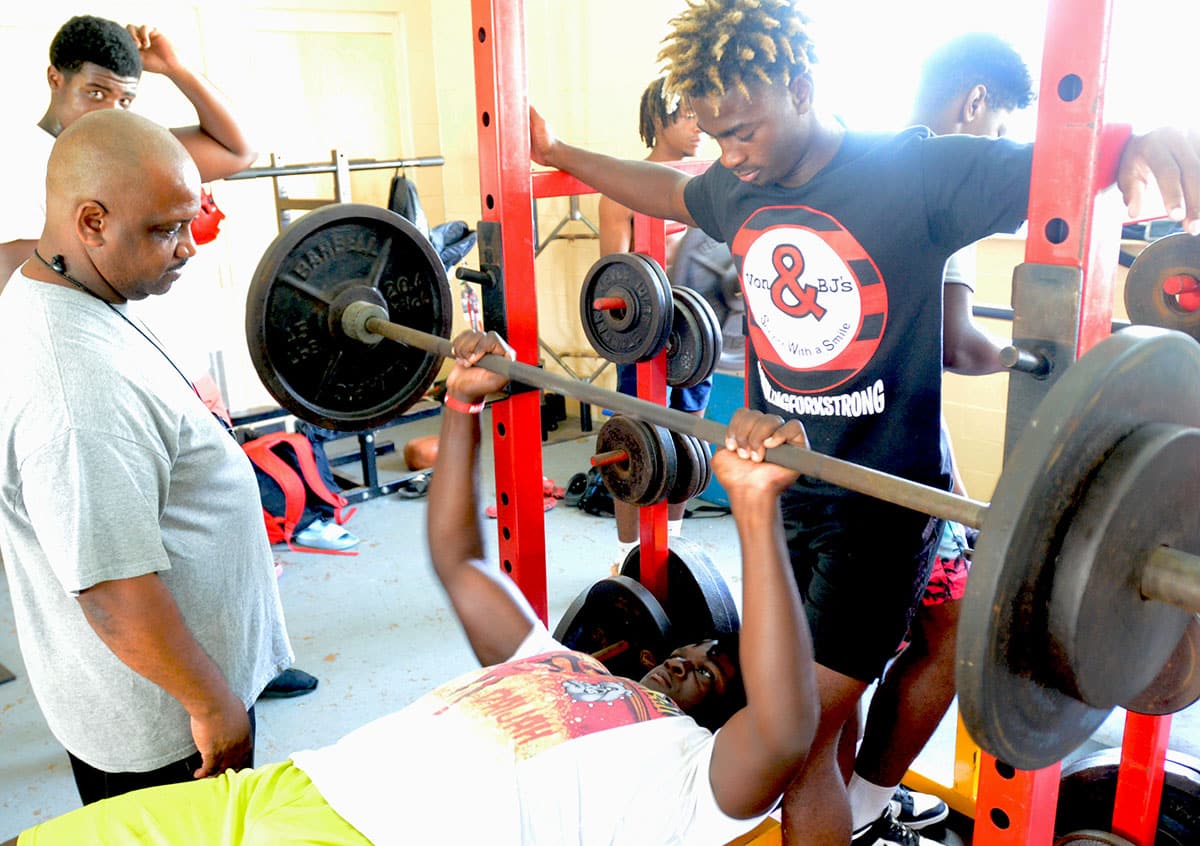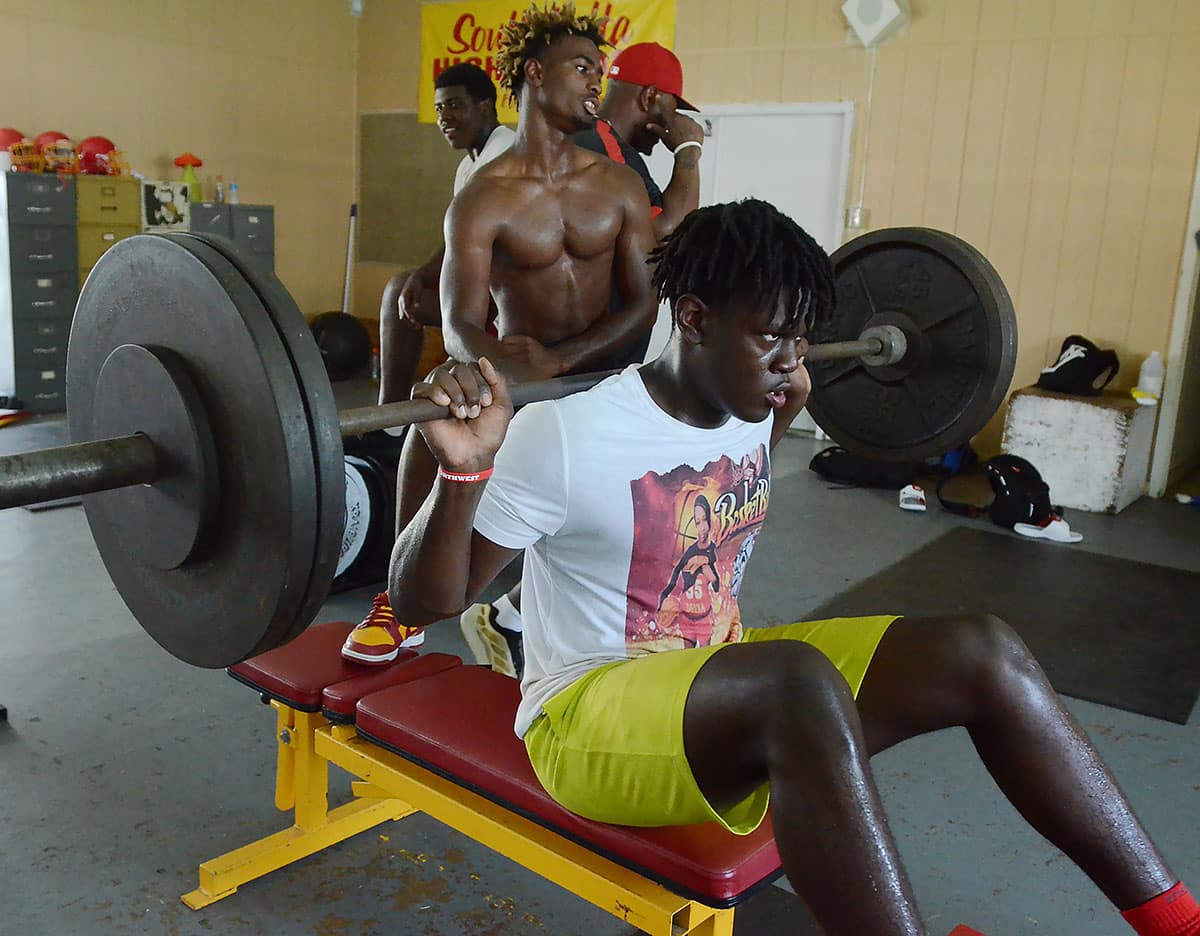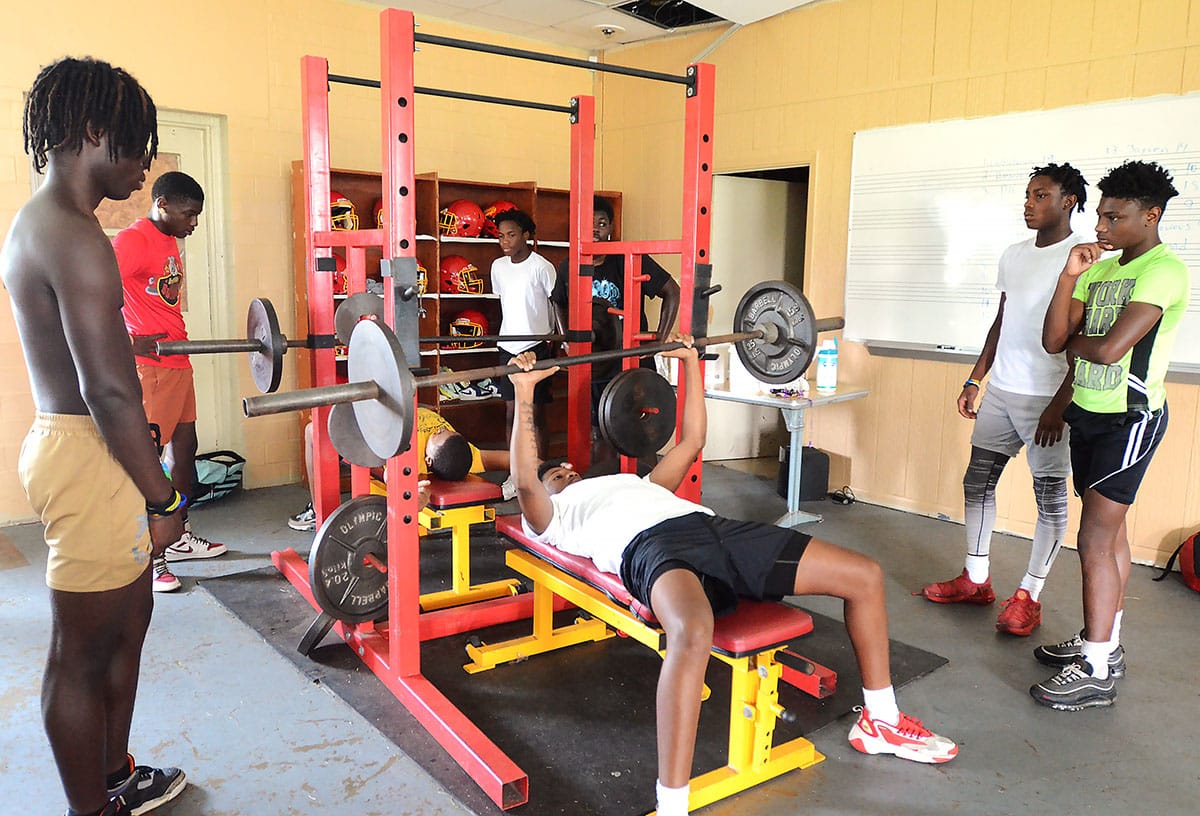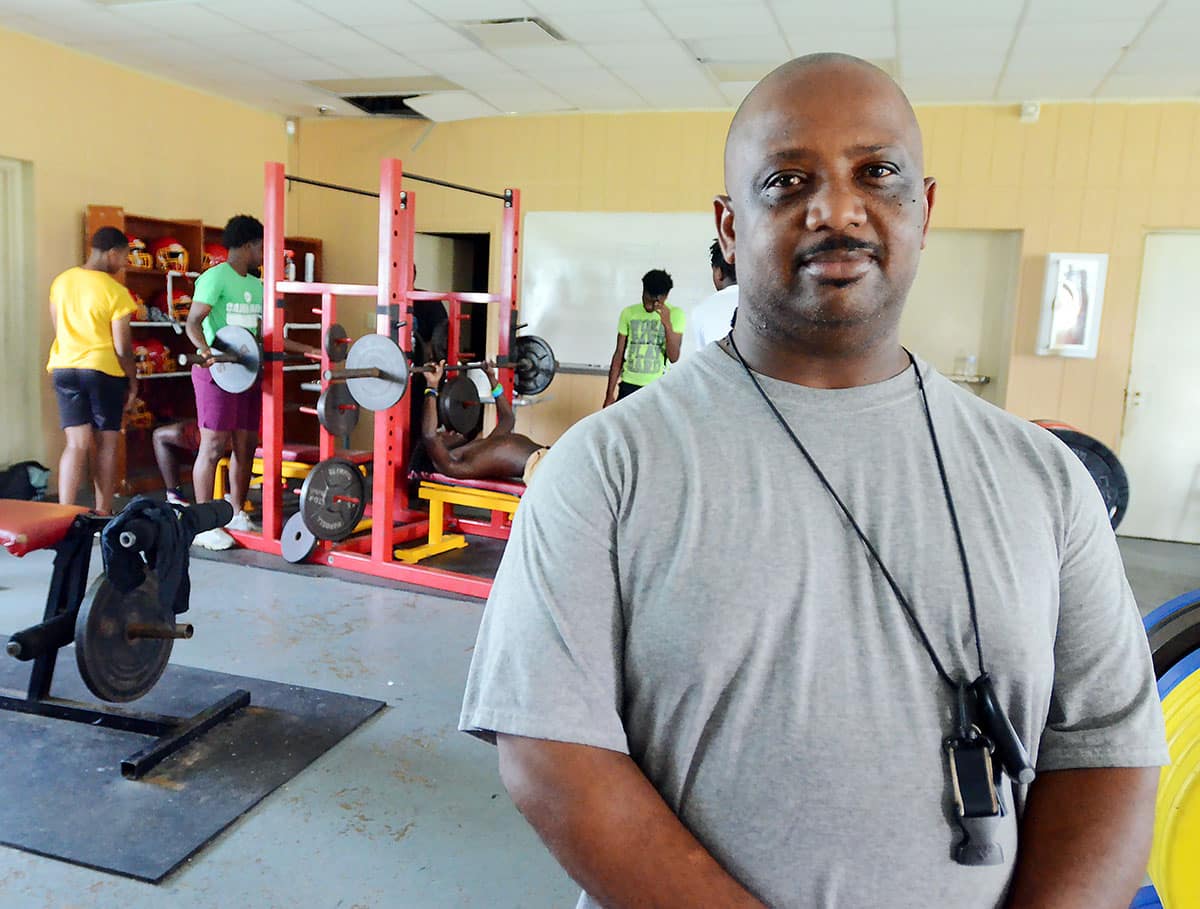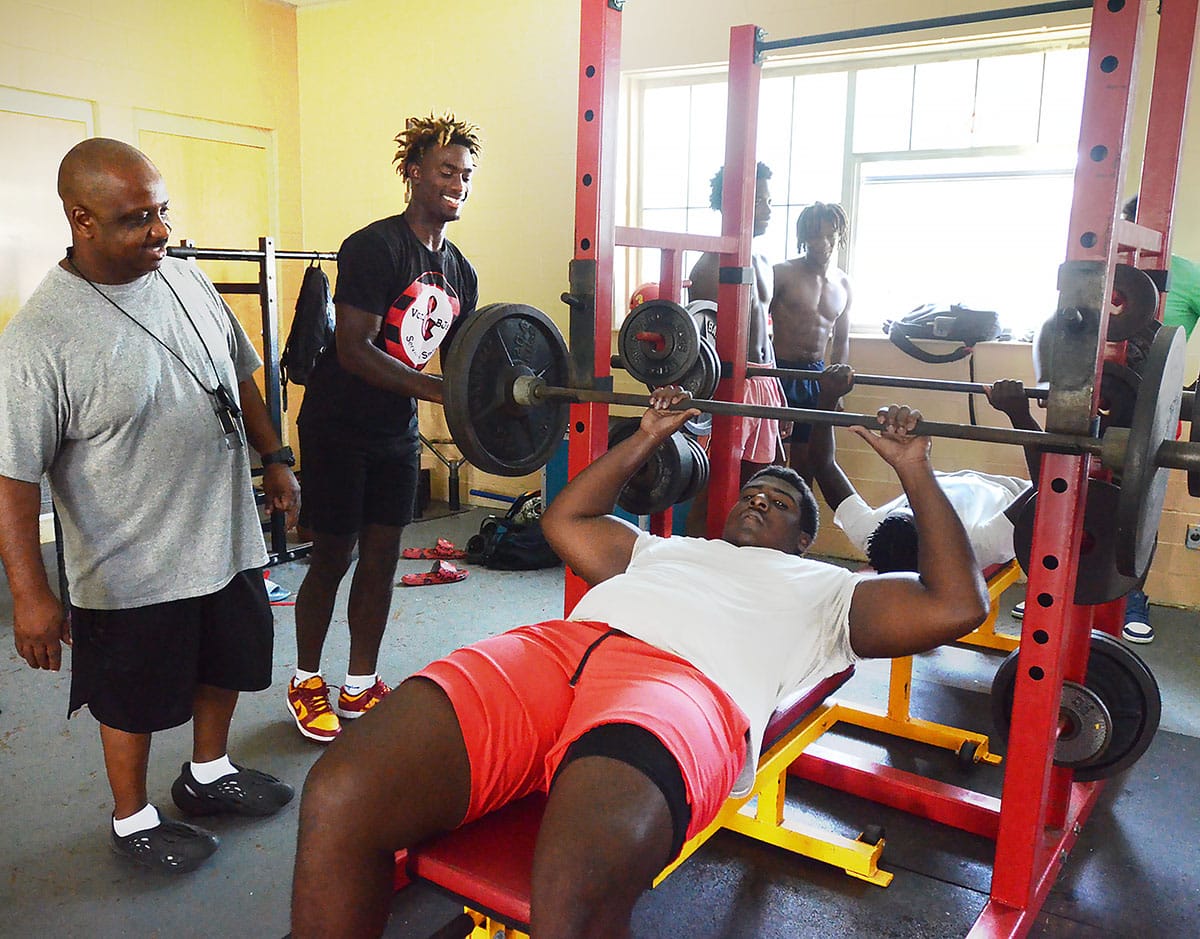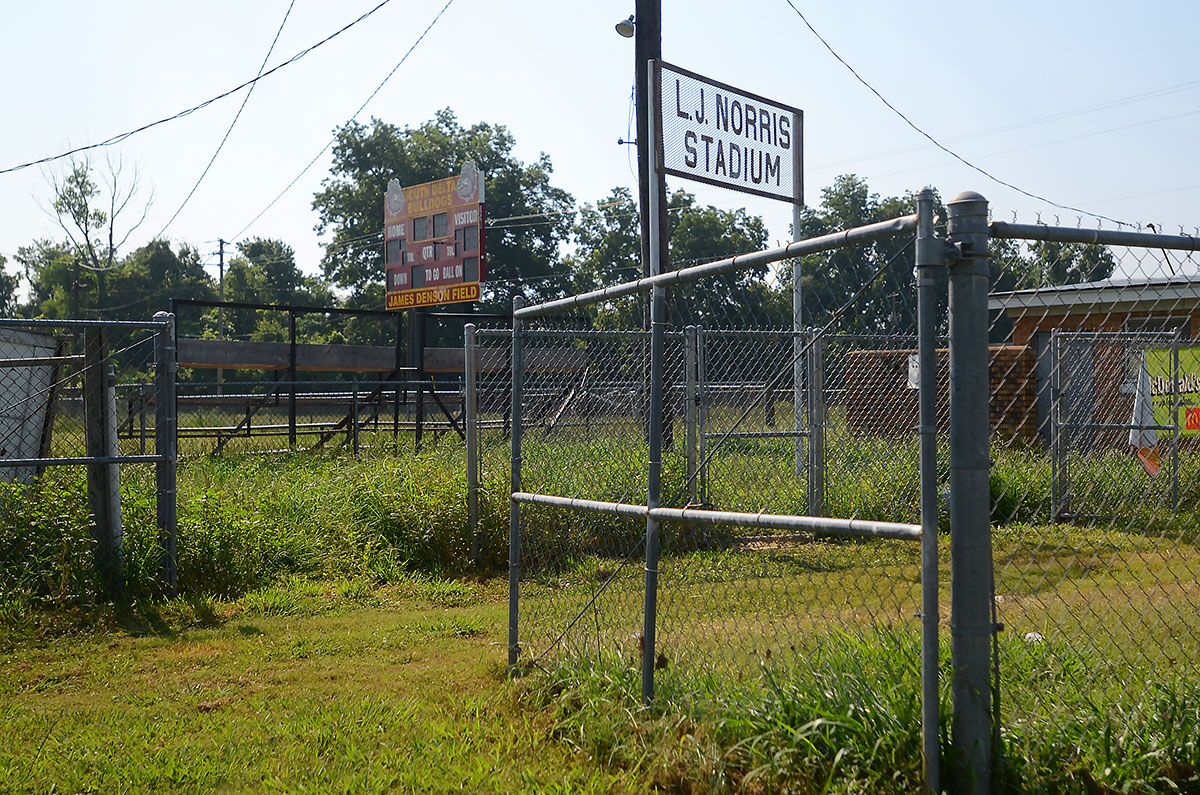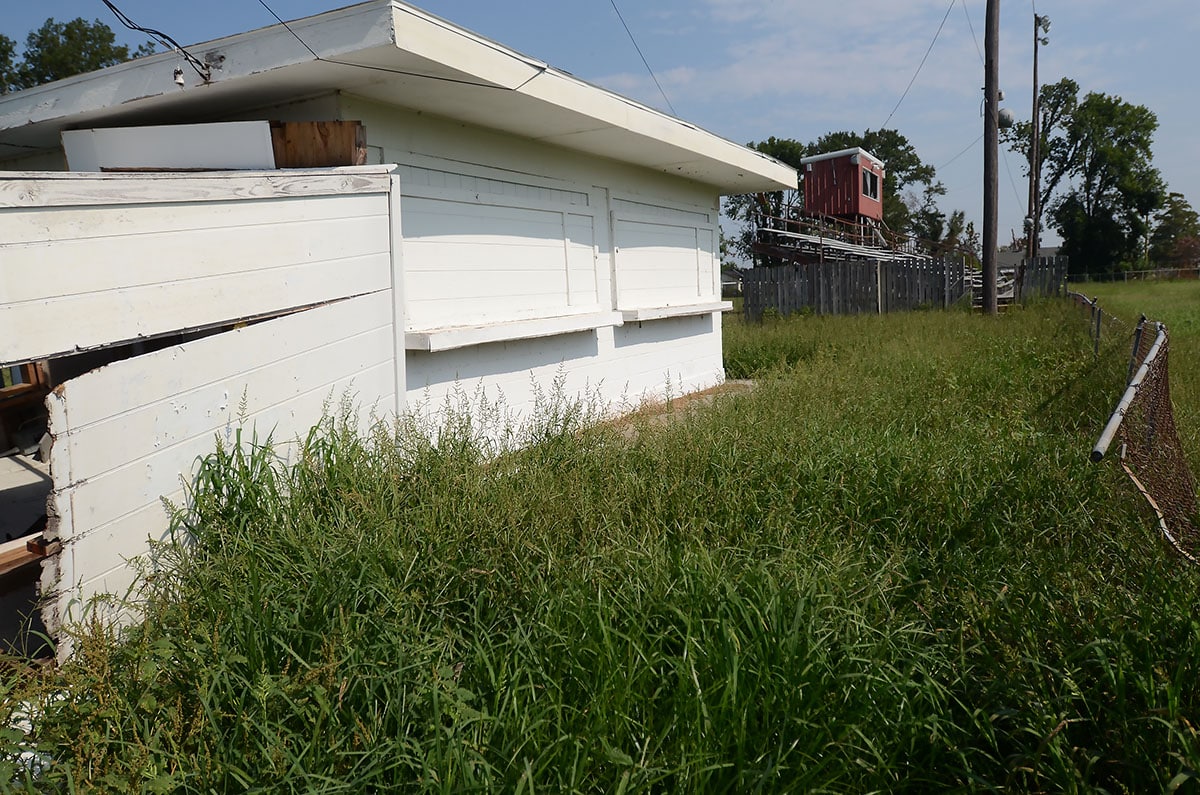Mississippi Today
South Delta Bulldogs give new meaning to ‘rebuilding year’ – with help from Archie Manning

ROLLING FORK – High school football coaches often bemoan “rebuilding years,” but few, if any, have ever faced anything like what South Delta head coach KePatrick Barnes is up against.
His Bulldogs have no place to play, and no uniforms to wear and no dressing room in which to dress – and that doesn’t even begin to describe the obstacles they face. The EF-4 tornado that blew through Rolling Fork on March 24, killing 14 people and injuring many more, left South Delta High School in shambles and unusable. Two of Barnes’ players lost their mothers in the storm. Another lost the grandmother who was raising him. Far more lost their homes. Some of those who have made it to summer workouts have been living with friends or relatives in Greenville, Leland, Yazoo City and Vicksburg.

The decrepit football stadium, which wasn’t much to look at before, is unusable now. Light poles are down, the ticket booth blown over, concession stands ruined, scoreboard inoperable, bleachers warped, press box windows smashed – that’s for starters. Most of the team’s uniforms were either lost in the storm or badly mildewed.
Where spectators would normally park for games, a tented, portable laundry operates to serve the community. The old gymnasium, which once housed the Bulldogs’ weight room, is now a distribution center to provide tornado victims with household necessities. The football team moved its weight equipment into the old band hall, where on a recent blistering hot, humid morning they lifted weights, dripping sweat, while shouting encouragement to one another over the loud clanging of barbells. There was no power, no air conditioning. On occasion, the Bulldogs have paused their summer lifting regimen to go move heavy boxes from an 18-wheeler into what used to be the distribution center that was once their weight room.
“It’s a different kind of lifting,” says Barnes, 45, a stocky former Alcorn State football player. “We try to help out when they need it”
School is back in session this week, but high school students are crammed into the middle school building five miles away in Anguilla where they finished the 2022-23 school year last spring. “It’s crowded but we make do,” says Coach Barnes, who guided the Bulldogs to a 9-3 record and into the second round of the state playoffs last year. “We are rolling up our sleeves and making the best of a really horrible situation.”
Some help is on the way, thanks to Ole Miss and NFL football great Archie Manning, who nearly six decades ago played for the Drew High Eagles in this same football facility in such sad shape now. Drew and Rolling Fork were in the same Delta Valley Conference in those days. “Rolling Fork was the Green Bay Packers of the Delta Valley Conference,” Manning says. “They beat everybody, they tore us up. They were a bunch of big, old farm boys who lifted weights back before it was fashionable.”

Manning says when he first heard about the deadly tornado of March 24, his first thoughts were of those Delta Valley Conference days “and the most fun I ever had in football, except when we had to play Rolling Fork. We at least scored on them my senior year. Most teams didn’t.”
Manning made some calls, including one to the Northwest Mississippi Community Foundation, and learned more about the South Delta situation. He knew of an NFL program where the league will match contributions (up to $5,000) of NFL players and former players to high school football teams. He wrote a check and the NFL has matched it. Hernando businessman Cal Wilkins heard of Manning’s donation and also matched it. Manning also talked to Riddell, the football equipment company that serves as a major sponsor of the Manning family’s Manning Passing Academy. Riddell has made a sizable donation of equipment, including custom fit, state of the art helmets. The company already has sent a representative to measure the players. The equipment is on the way.
“I hope it helps,” Manning says. “Lord knows, they need it.”
The school and the football team need much, much more. Erra Kelly, superintendent of South Delta School District, says she is still working with insurance company, FEMA and state authorities. What she says will be a first payment of insurance money – $750,000 – has been received. She awaits a final settlement before spending what has been received. A new school building, including new athletic facilities, would be the preference.
Kelly, the superintendent, and Barnes, the coach, are much appreciative of Manning’s assistance. Says Barnes, “To have a man of Archie Manning’s fame and stature reaching out and helping us means the world. We’re still a long way from getting back to where we were, but it’s a start.”
The roof on Barnes’ own house was just recently replaced because of extensive tornado damage. Three families – 12 people – currently live in the three-bedroom home. “Making do, the best we can,” is the way he put it, adding, “We’re better off than lots of others.”
Barnes has tried to be there for all his players. “So many of the guys are living somewhere else right now,” he says. “They haven’t been able to be here for the summer workouts, but we’re happy to see them when they do get here, and I text ‘em or try to talk to ‘em every day.”
South Delta and Rolling Fork have a strong football tradition. As with many small Mississippi communities, the high school football team is a rallying point for the town and surrounding area.
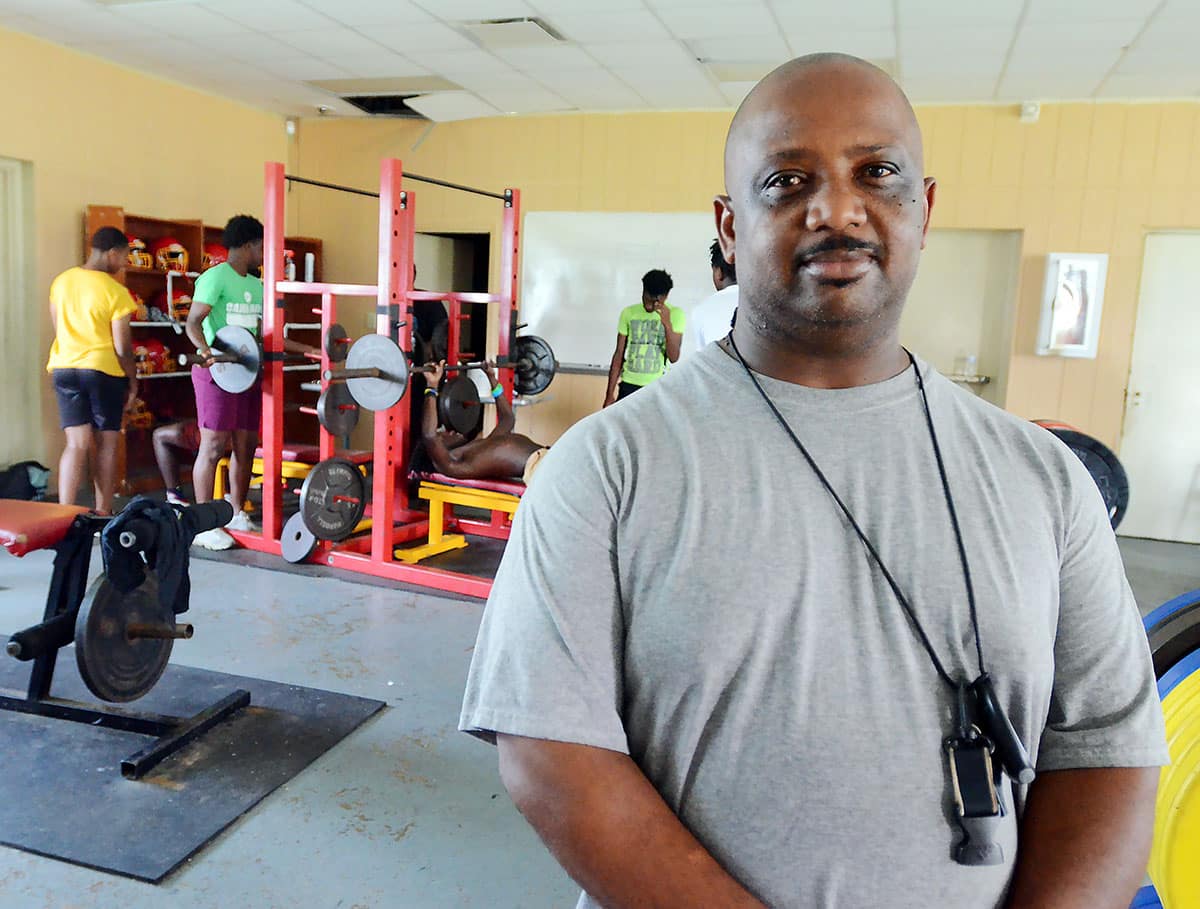
Labrodrick Williams, a 17-year-old senior, returns as a starter at quarterback and free safety. “I really think this whole thing has made us stronger,” Williams says. “We have to be strong for our community.”
Roderick Catledge, a 10th grade center nd linebacker, was among the many players displaced by the storm. He has spent the summer commuting from 40 miles away in Leland, riding with his mother who works two jobs in Rolling Fork. He arrived in time for 9 a.m. workouts and sometimes didn’t get back to Leland until after 11 p.m.
The Bulldogs will open the regular season on Aug. 25 at Yazoo County. They will play in Port Gibson as part of a pre-season jamboree at Mississippi Delta Community College Aug. 18. Their first home game is set for Sept. 8 against Leflore County. A decision is not expected until next week on where that game will be played.
Barnes believes the Bulldogs will be formidable again, no matter where they play and what equipment they wear.
“We’re going to make some noise,” Barnes says. “We’re going to try to put Rolling Fork on our backs, give people something to smile about.”
Anyone wishing to donate to South Delta High School’s or the athletic program’s recovery efforts can do so with a tax deductible donation through the Northwest Mississippi Community Foundation. Contact NMCF president Keith Fulcher at 662 719-1732 to learn how.
This article first appeared on Mississippi Today and is republished here under a Creative Commons license.
Did you miss our previous article…
https://www.biloxinewsevents.com/?p=273380
Mississippi Today
Mississippi River flooding Vicksburg, expected to crest on Monday
Warren County Emergency Management Director John Elfer said Friday floodwaters from the Mississippi River, which have reached homes in and around Vicksburg, will likely persist until early May. Elfer estimated there areabout 15 to 20 roads underwater in the area.
“We’re about half a foot (on the river gauge) from a major flood,” he said. “But we don’t think it’s going to be like in 2011, so we can kind of manage this.”
The National Weather projects the river to crest at 49.5 feet on Monday, making it the highest peak at the Vicksburg gauge since 2020. Elfer said some residents in north Vicksburg — including at the Ford Subdivision as well as near Chickasaw Road and Hutson Street — are having to take boats to get home, adding that those who live on the unprotected side of the levee are generally prepared for flooding.



“There are a few (inundated homes), but we’ve mitigated a lot of them,” he said. “Some of the structures have been torn down or raised. There are a few people that still live on the wet side of the levee, but they kind of know what to expect. So we’re not too concerned with that.”
The river first reached flood stage in the city — 43 feet — on April 14. State officials closed Highway 465, which connects the Eagle Lake community just north of Vicksburg to Highway 61, last Friday.

Elfer said the areas impacted are mostly residential and he didn’t believe any businesses have been affected, emphasizing that downtown Vicksburg is still safe for visitors. He said Warren County has worked with the U.S. Army Corps of Engineers and the Mississippi Emergency Management Agency to secure pumps and barriers.
“Everybody thus far has been very cooperative,” he said. “We continue to tell people stay out of the flood areas, don’t drive around barricades and don’t drive around road close signs. Not only is it illegal, it’s dangerous.”
NWS projects the river to stay at flood stage in Vicksburg until May 6. The river reached its record crest of 57.1 feet in 2011.




This article first appeared on Mississippi Today and is republished here under a Creative Commons Attribution-NoDerivatives 4.0 International License.![]()
Mississippi Today
With domestic violence law, victims ‘will be a number with a purpose,’ mother says
Joslin Napier. Carlos Collins. Bailey Mae Reed.
They are among Mississippi domestic violence homicide victims whose family members carried their photos as the governor signed a bill that will establish a board to study such deaths and how to prevent them.
Tara Gandy, who lost her daughter Napier in Waynesboro in 2022, said it’s a moment she plans to tell her 5-year-old grandson about when he is old enough. Napier’s presence, in spirit, at the bill signing can be another way for her grandson to feel proud of his mother.
“(The board) will allow for my daughter and those who have already lost their lives to domestic violence … to no longer be just a number,” Gandy said. “They will be a number with a purpose.”
Family members at the April 15 private bill signing included Ashla Hudson, whose son Collins, died last year in Jackson. Grandparents Mary and Charles Reed and brother Colby Kernell attended the event in honor of Bailey Mae Reed, who died in Oxford in 2023.
Joining them were staff and board members from the Mississippi Coalition Against Domestic Violence, the statewide group that supports shelters and advocated for the passage of Senate Bill 2886 to form a Domestic Violence Facility Review Board.
The law will go into effect July 1, and the coalition hopes to partner with elected officials who will make recommendations for members to serve on the board. The coalition wants to see appointees who have frontline experience with domestic violence survivors, said Luis Montgomery, public policy specialist for the coalition.
A spokesperson from Gov. Tate Reeves’ office did not respond to a request for comment Friday.
Establishment of the board would make Mississippi the 45th state to review domestic violence fatalities.
Montgomery has worked on passing a review board bill since December 2023. After an unsuccessful effort in 2024, the coalition worked to build support and educate people about the need for such a board.
In the recent legislative session, there were House and Senate versions of the bill that unanimously passed their respective chambers. Authors of the bills are from both political parties.
The review board is tasked with reviewing a variety of documents to learn about the lead up and circumstances in which people died in domestic violence-related fatalities, near fatalities and suicides – records that can include police records, court documents, medical records and more.
From each review, trends will emerge and that information can be used for the board to make recommendations to lawmakers about how to prevent domestic violence deaths.
“This is coming at a really great time because we can really get proactive,” Montgomery said.
Without a board and data collection, advocates say it is difficult to know how many people have died or been injured in domestic-violence related incidents.
A Mississippi Today analysis found at least 300 people, including victims, abusers and collateral victims, died from domestic violence between 2020 and 2024. That analysis came from reviewing local news stories, the Gun Violence Archive, the National Gun Violence Memorial, law enforcement reports and court documents.
Some recent cases the board could review are the deaths of Collins, Napier and Reed.
In court records, prosecutors wrote that Napier, 24, faced increased violence after ending a relationship with Chance Fabian Jones. She took action, including purchasing a firearm and filing for a protective order against Jones.
Jones’s trial is set for May 12 in Wayne County. His indictment for capital murder came on the first anniversary of her death, according to court records.
Collins, 25, worked as a nurse and was from Yazoo City. His ex-boyfriend Marcus Johnson has been indicted for capital murder and shooting into Collins’ apartment. Family members say Collins had filed several restraining orders against Johnson.
Johnson was denied bond and remains in jail. His trial is scheduled for July 28 in Hinds County.
He was a Jackson police officer for eight months in 2013. Johnson was separated from the department pending disciplinary action leading up to immediate termination, but he resigned before he was fired, Jackson police confirmed to local media.
Reed, 21, was born and raised in Michigan and moved to Water Valley to live with her grandparents and help care for her cousin, according to her obituary.
Kylan Jacques Phillips was charged with first degree murder for beating Reed, according to court records. In February, the court ordered him to undergo a mental evaluation to determine if he is competent to stand trial, according to court documents.
At the bill signing, Gandy said it was bittersweet and an honor to meet the families of other domestic violence homicide victims.
“We were there knowing we are not alone, we can travel this road together and hopefully find ways to prevent and bring more awareness about domestic violence,” she said.
This article first appeared on Mississippi Today and is republished here under a Creative Commons Attribution-NoDerivatives 4.0 International License.
Mississippi Today
Court to rule on DeSoto County Senate districts with special elections looming
A federal three-judge panel will rule in coming days on how political power in northwest Mississippi will be allocated in the state Senate and whether any incumbents in the DeSoto County area might have to campaign against each other in November special elections.
The panel, comprised of all George W. Bush-appointed judges, ordered state officials last week to, again, craft a new Senate map for the area in the suburbs of Memphis. The panel has held that none of the state’s prior maps gave Black voters a realistic chance to elect candidates of their choice.
The latest map proposed by the all-Republican State Board of Election Commissioners tweaked only four Senate districts in northwest Mississippi and does not pit any incumbent senators against each other.
The state’s proposal would keep the Senate districts currently held by Sen. Michael McLendon, a Republican from Hernando and Sen. Kevin Blackwell, a Republican from Southaven, in majority-white districts.
But it makes Sen. David Parker’s district a slightly majority-Black district. Parker, a white Republican from Olive Branch, would run in a district with a 50.1% black voting-age population, according to court documents.
The proposal also maintains the district held by Sen. Reginald Jackson, a Democrat from Marks, as a majority-Black district, although it reduces the Black voting age population from 61% to 53%.
Gov. Tate Reeves, Secretary of State Michael Watson, and Attorney General Lynn Fitch comprise the State Board of Election Commissioners. Reeves and Watson voted to approve the plan. But Watson, according to meeting documents, expressed a wish that the state had more time to consider different proposals.
Fitch did not attend the meeting, but Deputy Attorney General Whitney Lipscomb attended in her place. Lipscomb voted against the map, although it is unclear why. Fitch’s office declined to comment on why she voted against the map because it involves pending litigation.
The reason for redrawing the districts is that the state chapter of the NAACP and Black voters in the state sued Mississippi officials for drawing legislative districts in a way that dilutes Black voting power.
The plaintiffs, represented by the ACLU, are likely to object to the state’s newest proposal, and they have until April 29 to file an objection with the court
The plaintiffs have put forward two alternative proposals for the area in the event the judges rule against the state’s plans.
The first option would place McLendon and Blackwell in the same district, and the other would place McLendon and Jackson in the same district.
It is unclear when the panel of judges will issue a ruling on the state’s plan, but they will not issue a ruling until the plaintiffs file their remaining court documents next week.
While the November election is roughly six months away, changing legislative districts across counties and precincts is technical work, and local election officials need time to prepare for the races.
The judges have not yet ruled on the full elections calendar, but U.S. Fifth Circuit Court of Appeals Judge Leslie Southwick said at a hearing earlier this month that the panel was committed have the elections in November.
This article first appeared on Mississippi Today and is republished here under a Creative Commons Attribution-NoDerivatives 4.0 International License.
-

 News from the South - Florida News Feed6 days ago
News from the South - Florida News Feed6 days agoJim talks with Rep. Robert Andrade about his investigation into the Hope Florida Foundation
-

 News from the South - Arkansas News Feed7 days ago
News from the South - Arkansas News Feed7 days agoValerie Storm Tracker
-

 News from the South - Kentucky News Feed7 days ago
News from the South - Kentucky News Feed7 days agoU.S. Supreme Court pauses deportations under wartime law
-

 News from the South - Alabama News Feed4 days ago
News from the South - Alabama News Feed4 days agoPrayer Vigil Held for Ronald Dumas Jr., Family Continues to Pray for His Return | April 21, 2025 | N
-

 Mississippi Today5 days ago
Mississippi Today5 days ago‘Trainwreck on the horizon’: The costly pains of Mississippi’s small water and sewer systems
-

 News from the South - Texas News Feed5 days ago
News from the South - Texas News Feed5 days agoMeteorologist Chita Craft is tracking a Severe Thunderstorm Warning that's in effect now
-

 News from the South - Florida News Feed4 days ago
News from the South - Florida News Feed4 days agoTrump touts manufacturing while undercutting state efforts to help factories
-

 Mississippi Today7 days ago
Mississippi Today7 days agoOn this day in 1977, Alex Haley awarded Pulitzer for ‘Roots’
